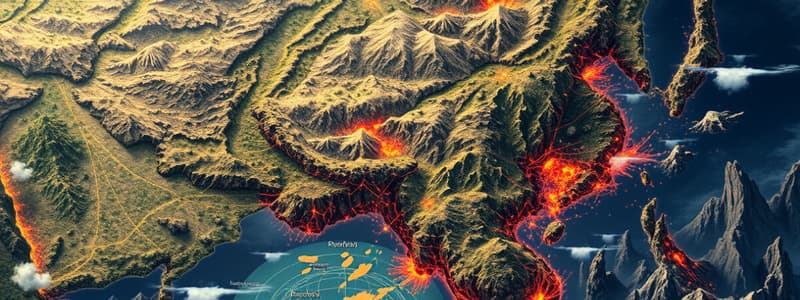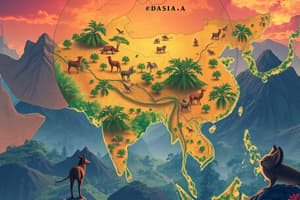Podcast
Questions and Answers
What percentage of the world's population resides in Asia?
What percentage of the world's population resides in Asia?
- 50%
- 70%
- 30%
- 60% (correct)
Which two countries have the largest populations in Asia?
Which two countries have the largest populations in Asia?
- China and Japan
- China and India (correct)
- India and Indonesia
- Pakistan and Bangladesh
What geographical feature separates Asia from Europe?
What geographical feature separates Asia from Europe?
- Andes Mountains
- Himalayas
- Suez Canal
- Ural Mountains (correct)
How far does Asia stretch from north to south?
How far does Asia stretch from north to south?
What is the primary cause of Asia's unique physical geography?
What is the primary cause of Asia's unique physical geography?
Which bodies of water separate Asia from North America?
Which bodies of water separate Asia from North America?
What forms the border between Asia and Africa?
What forms the border between Asia and Africa?
How many sovereign states are there in Asia?
How many sovereign states are there in Asia?
Which countries are included in East Asia?
Which countries are included in East Asia?
What is the highest peak in the Himalayas?
What is the highest peak in the Himalayas?
Which mountain range is known as the 'roof of the world'?
Which mountain range is known as the 'roof of the world'?
Which of the following is a characteristic of the Northern Lowlands?
Which of the following is a characteristic of the Northern Lowlands?
What is the highest peak in the Hindu Kush Mountains?
What is the highest peak in the Hindu Kush Mountains?
Which region includes the countries of Brunei, Cambodia, and Thailand?
Which region includes the countries of Brunei, Cambodia, and Thailand?
What is the largest mountain range in Iran?
What is the largest mountain range in Iran?
Which of the following describes the Central Highlands of Asia?
Which of the following describes the Central Highlands of Asia?
What is the highest peak in the Karakoram Range?
What is the highest peak in the Karakoram Range?
Which region includes the countries of India and Pakistan?
Which region includes the countries of India and Pakistan?
What is unique about Lake Baikal?
What is unique about Lake Baikal?
Which is the primary river contributing to the Great River Basins?
Which is the primary river contributing to the Great River Basins?
What divides South Asia from the rest of Asia?
What divides South Asia from the rest of Asia?
Which component is part of the Southern Plateaus region?
Which component is part of the Southern Plateaus region?
What is the primary characteristic of the Deccan Plateau's elevation?
What is the primary characteristic of the Deccan Plateau's elevation?
Which plateau is known for being intensely dry with no rivers?
Which plateau is known for being intensely dry with no rivers?
What feature characterizes the Himalayan mountain ranges in relation to river valleys?
What feature characterizes the Himalayan mountain ranges in relation to river valleys?
What is the largest desert in Asia?
What is the largest desert in Asia?
Which river does the Tigris-Euphrates valley flow through?
Which river does the Tigris-Euphrates valley flow through?
What is the main feature of the Yunnan Plateau's elevation?
What is the main feature of the Yunnan Plateau's elevation?
Which desert is known as Asia’s only subtropical desert?
Which desert is known as Asia’s only subtropical desert?
What characterizes the Caspian Sea despite fresh water inflow?
What characterizes the Caspian Sea despite fresh water inflow?
Which archipelago is the largest in the world?
Which archipelago is the largest in the world?
What is notable about Lake Baikal?
What is notable about Lake Baikal?
What type of geological formation is the Shan Plateau?
What type of geological formation is the Shan Plateau?
What are the primary rivers that form the Ganga-Brahmaputra valley?
What are the primary rivers that form the Ganga-Brahmaputra valley?
Which plateau is characterized by an elevation range of 750 to 1,200 metres?
Which plateau is characterized by an elevation range of 750 to 1,200 metres?
What is a key characteristic of the Arabian Desert?
What is a key characteristic of the Arabian Desert?
Flashcards are hidden until you start studying
Study Notes
Overview of Asia
- Largest continent by land area and population, covering about 30% of the world's land and housing approximately 60% of the global population.
- Major populations concentrated in China (1.4 billion) and India (1.3 billion).
Physical Geography
- Shaped by the movement of tectonic plates, leading to significant volcanic activity and mountain formations.
- Home to diverse landscapes: coastlines, mountains, jungles, and modern cities.
Geographical Boundaries
- Extends from 10°S to 80°N latitude and 25°E to 170°W longitude.
- North-south distance: 8,560 km; East-west distance: 9,600 km.
- Bounded by the Arctic Ocean (north), Pacific Ocean (east), Indian Ocean (south), Mediterranean Sea and Black Sea (south-west), and Europe (west).
- Separated from North America by the Bering Strait and from Australia by straits connecting the Indian and Pacific Oceans.
Political Geography
- Comprises 49 sovereign states, 6 states with limited recognition, and 6 dependent territories.
Regional Divisions
- East Asia: Includes China, Mongolia, North Korea, South Korea, Japan, and Taiwan (28% of the continent).
- North Asia: Refers to Siberia and Russia's Asia-Pacific region.
- Central Asia: Encompasses former Soviet Republics including Kazakhstan and Uzbekistan, bordered by the Caspian Sea to the west.
- South-East Asia: Countries like Indonesia, Malaysia, Philippines, and Vietnam.
- South Asia: Contains Afghanistan, India, Pakistan, and others, sustaining about one-fourth of the world’s population.
- West Asia: Comprises countries such as Saudi Arabia, Iran, and Turkey.
Major Physical Regions
- Northern Lowlands: Spanning from Ural Mountains to the Bering Sea, characterized by plains created by the Ob, Yenisei, and Lena rivers.
- Central Highlands: Includes major mountain ranges converging at the Pamir Knot; significant ranges include the Himalayas, Karakoram, and Hindu Kush.
- Southern Plateaus: Features plateaus like the Deccan Plateau in India and Arabian Plateau.
- Great River Basins: Fertile valleys created by major rivers such as the Tigris, Indus, and Ganga-Brahmaputra.
- Island Groups: Includes the Malay Archipelago and Japanese Archipelago, featuring thousands of islands.
Key Mountain Ranges
- Himalayas: Highest mountain range globally, with peaks over 8,000 meters including Mount Everest (8,848 m).
- Karakoram Range: Home to K2, the second highest peak (8,611 m).
- Hindu Kush: Peaks like Mount Tirich Mir (7,690 m) separate Afghanistan and Central Asia.
Important Deserts
- Arabian Desert: Largest in Asia at 2.33 million square km.
- Gobi Desert: Second largest, spanning northern China and Mongolia (1.295 million square km).
- Taklamakan Desert: China's largest, covering 337,000 square km.
- Thar Desert: Asia’s only subtropical desert, located mostly in Rajasthan, India.
Major Water Bodies
- Caspian Sea: Largest lake in the world, about 371,000 square km, remains salty despite fresh water inflow.
- Lake Baikal: Oldest and deepest freshwater lake, reaching depths of 1,637 m (5,315 ft).
- Aral Sea: Diminishing lake between Kazakhstan and Uzbekistan, suffering from severe pollution and drying.
Conclusion
- Asia's landscapes and features present incredible diversity in culture, nature, and geography, highlighting its importance on a global scale.
Studying That Suits You
Use AI to generate personalized quizzes and flashcards to suit your learning preferences.




